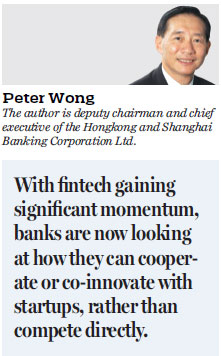Fintech an opportunity, not a threat, to banking industry
Updated: 2017-02-09 09:32
By Peter Wong(HK Edition)
|
|||||||||
Peter Wong argues that far from feeling threatened by rapidly advancing technology, established banks should embrace it to remain key players in the financial sector
The new wave of financial technology - better known as fintech - is often portrayed as a disruptive force that threatens banks with new, agile and savvy competitors. Fintech is transforming the way people and companies connect with their banks, and the way banks manage their back-office operations.
Fintech complements rather than threatens banking institutions. In my experience, banking has always been about technology, so today's fintech innovation boom represents evolution rather than revolution for traditional banking. It is supplementing and diversifying the existing financial system - not replacing or disrupting it.
Since the global financial crisis of 2007-08, regulations have continued to evolve and become increasingly complex, which means more costly and time-consuming processes for banks. At the same time, a new challenge has emerged: fintech.

Fintech innovators harness internet and mobile technologies and big data to offer a range of tools and services - from tech-enabled payments and crowdfunding, to currency exchange, online lending and wealth management services. The goal is to make financial services more efficient, and improve the services that customers get from their banks.
The fintech market has attracted a gold rush of investment in recent years, particularly by venture capital firms that are eager to back startups in the sector. In the Asia-Pacific region alone, investment in fintech players has risen from $103 million in 2010 to $4.3 billion in 2015, according to Accenture. Furthermore, in the first seven months of 2016, investment in the region has reached $9.6 billion, doubling 2015's figure.
However, to say that the fintech boom is cannibalizing traditional banking would be an exaggeration.
If we look closely, fintech is currently only focusing on a mere fraction of the financial services spectrum. To date, much of the focus of fintech has been on retail banking services - lending and financing along with payments-related products and services, where mobile and e-commerce has led to real demand from consumers.
Similarly, peer-to-peer lenders appear to be more focused on small businesses and higher-credit-risk borrowers than on mainstream banked clients.
We have seen major technological innovations in the past - credit cards, automated banking machines and online banking, to name just a few.
Those changes provided huge advances in convenience for consumers, but they did not revolutionize the financial landscape: Financial institutions remained the dominant players and adapted to these changes.
Unlike fintech startups, banks have had decades to build extensive infrastructures, develop solutions for compliance and regulatory requirements and - most importantly - earn consumer trust.
Banks are investing heavily in new technologies. And spending is expected to continue to grow as banks seek to take advantage of new IT and digital solutions to make their operations more efficient, comply with regulators while simultaneously increasing interaction with customers in order to maintain competitiveness. Cloud computing, big data, advanced analytics such as data storage technology that enables high-speed analysis of massive data sets, blockchains, artificial intelligence and quantum computing - to name just a few - offer significant opportunities for banks.
Another approach gaining traction with many major banks is the creation of innovation labs - semi-autonomous groups funded to accelerate innovation and incorporate new technologies and skill sets. These labs are creative think tanks where the futures of traditional financial institutions are being nurtured.
But equally, with fintech gaining significant momentum, banks are now looking at how they can cooperate or co-innovate with startups, rather than compete directly.
Big banks and fintech startups have a great deal to offer each other. Banks have a large customer base, stable infrastructure, assets and regulatory know-how. Startups provide out-of-the-box thinking, technical expertise, and agility to adapt quickly to change.
Together, they can be far more successful at improving the financial services and customer experience than if they compete against one another. And we will witness far greater collaboration and integration in the coming years.
Hong Kong has yet to develop a sizable fintech industry. However, the city is well placed to establish itself as a fintech hub for the Asia-Pacific region. As an international financial hub, Hong Kong connects the Chinese mainland with global markets, making it ideal for startups and established companies that want to develop and apply fintech solutions.
Hong Kong can leverage its existing financial expertise, resources and infrastructure to form an "ecosystem" composed of governments, financial institutions and entrepreneurs. This is critical to nurture technological innovation making financial markets and systems more efficient and improving the overall customer experience.
Most importantly, a vibrant fintech ecosystem is also in Hong Kong's wider interest, as it can stimulate the broader local economy by attracting talented, ambitious people and to become a center of creative thinking.
To further support the development of fintech in the banking sector, the government recently launched the "Fintech Supervisory Sandbox" which allows banks to conduct testing and trials of newly developed technologies and applications on a pilot basis. Meanwhile, the government has budgeted over HK$17 billion for technology and innovation purposes, which will go a long way to begin building the environment necessary to support a fintech center.
Talent is also vital for this development. Hong Kong needs to find a way to develop more home-grown coders, developers and engineering talents. That starts with investing in our schools and offering scholarships to the most promising students.
It is clear that retail banking, particularly, will look quite different in the coming year than it does today - with regulation, technology, demographics and changing customer expectations. In as much as fintech putting pressure on banks, it is far from being a disruption. The established banks are likely to remain key players.
(HK Edition 02/09/2017 page8)